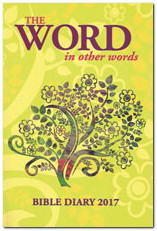THE WORD
Heb 13, 1-8 /Mk 6,14-29
The apostles gathered together with Jesus and reported all they had done and taught. He said to them, “Come away by yourselves to a deserted place and rest a while." People were coming and going in great numbers, and they had no opportunity even to eat. So they went off in the boat by themselves to a deserted place. People saw them leaving and many came to know about it. They hastened there on foot from all the towns and arrived at the place before them. When he disembarked and saw the vast crowd, his heart was moved with pity for them, for they were like sheep without a shepherd; and he began to teach them many things.
IN OTHER WORD
It was one thirty in the aftemoon when I met four young ladies leaning on the wall with shoes off their feet. Beaming with smiles, they greeted me, their aura vibrant. They asked for my blessing and said, “We are volunteers for food service.” I guessed they were dead tired. I thanked them. I knew it was not a joke to serve more than five thousand delegates to the International Eucharistic Congress in Cebu City on January 24-31, 2016. There were five thousand of them who volunteered to serve in any capacity they could. Filipinos at their best are capable of service to humanity, foregoing their personal needs and comfort zones. Admirable! In the Gospel of today Jesus Went to a deserted place for He and His apostles haS no opportunity even to eat. However, when He disembarked, He saw the people like sheep without a shepherd. His heart was moved with pity and He taught them many things. Can I too, “disembark from my boat,” my comfort zone and be like Jesus? What can l do to reach out to the poor?
• Sister Mildred Arcos, SSpS (Tayum, Abra)
The Word in other words 2017
An annual project of Logos Publications, The WORD in Other Words Bible Diary contains daily scripture readings and reflections written by priest, brothers, and sisters of the three congregations founded by St. Arnold Janssen (the SVD, SSpS, and SSpSAP). It hopes to serve as a daily companion to readers who continually seek the correlation of the Word of God and human experience.


